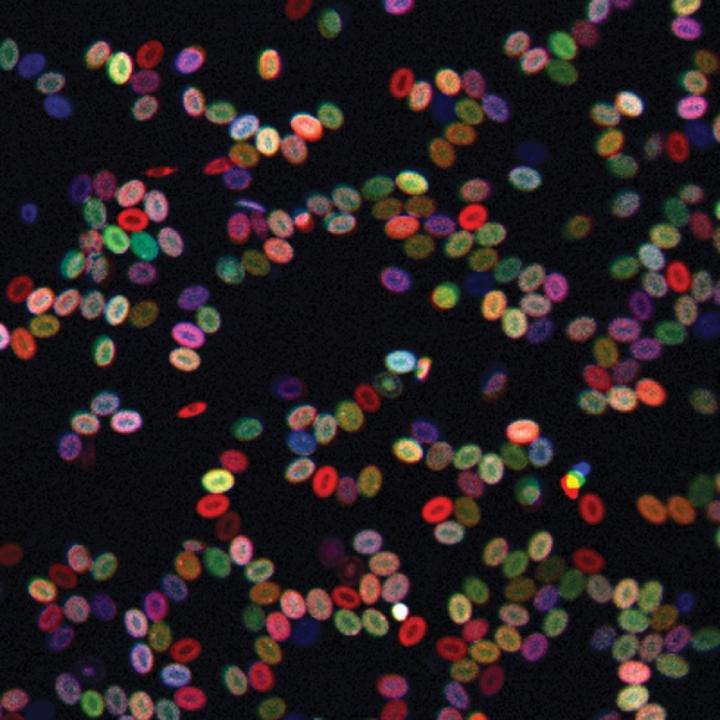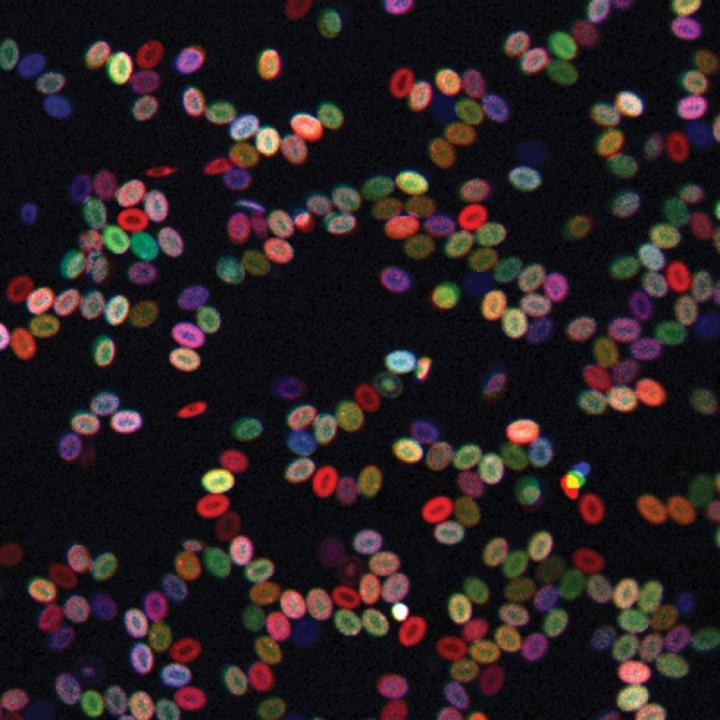
Credit: Nature Cell Biology 2016, Henninger et al
A new color-coding tool is enabling scientists to better track live blood stem cells over time, a key part of understanding how blood disorders and cancers like leukemia arise, report researchers in Boston Children's Hospital's Stem Cell Research Program.
In Nature Cell Biology they describe the use of their tool in zebrafish to track blood stem cells the fish are born with, the clones (copies) these cells make of themselves and the types of specialized blood cells they give rise to (red cells, white cells and platelets). Leonard Zon, MD, director of the Stem Cell Research Program and a senior author on the paper, believes the tool has many implications for hematology and cancer medicine since zebrafish are surprisingly similar to humans genetically.
People are born with a certain number of blood stem cells and rely on them for life. Various blood disorders and cancers are thought to arise when a mutant clone of an original blood stem cell starts to dominate. But what actually happens with blood stem cells over time has been hard to pin down.
"There's significant interest in determining how a stem cell clone expands, what makes one clone dominant, and why that predisposes you to cancer and blood disorders," says Zon.
All the colors of the rainbow
Zon, with David Traver, PhD, of the University of California at San Diego, first author Jonathan Henninger of Boston Children's and other colleagues, used a specially bred zebrafish called Zebrabow that has multiple copies of genes for red-blue-gene fluorescent protein scattered through its genome. By activating certain enzymes, the team cut the red-blue-green assembly in different ways and in different amounts. This technique yields, in theory, about 80 different colors based on the cell's overall proportions of each fluorescent protein — each color representing a different clone or variety of blood stem cell.
"It's like an RGB television set, where red, blue and green give you the whole spectrum of colors," explains Zon. "In our system, the enzyme cuts out different parts –blue, for example, or green and blue — so the stem cell will end up a different shade of color. In this way, we were able to mark each stem cell being born with a different color, and then follow the colors through development and see how many stem cells of each color were present in the adult fish."
Other scientists have developed tracking systems based on genetic "barcodes." But these require dissecting the cells, so cannot analyze living, circulating cell populations.
"Because our system is based on color, we don't have to destroy the cells to analyze their clonality," adds Henninger, a PhD candidate in the Zon Lab. "Rather, we can isolate the cells by color, with the help of computational tools, and then look at what genetic factors are involved in their expansion."
Understanding blood disease, cancer and bone marrow transplant
A normal blood system tends to have a diversity of clonal stem cell types — all cells being genetically identical but with different epigenetic changes that affect gene expression. Being able to track how different clonal populations develop has many implications for medicine.
For example, leukemia and myelodysplastic disorders (in which certain kinds of blood cells aren't made or don't mature properly) are thought to arise from a clone of an original stem cell that went amok and began replicating in great numbers.
But until now, this has been hard to analyze, since no one knew how many blood stem cells we start out with. Based on the zebrafish data, Henninger and Zon estimate that blood stem cells make up about 20 percent of all blood cell progenitors at the time they are formed.
That provides a starting point for exploring, for example, why and how a particular blood stem cell clone may begin to expand as people age, posing a risk for leukemia, or how cancer chemotherapy can sometimes transform tumor cells.
"Within a tumor, you can get clones of cells that become resistant to chemotherapy, and that's what kills the person," Zon explains. "The questions are, 'what makes a clone take off and start to behave differently than the rest? How is clonal diversity regulated?'"
Similarly, the knowledge could also help improve bone marrow transplant for a variety of childhood and adult disorders. "When you do a bone marrow transplant, only certain clones of stem cells take," Zon explains. "This is important because these clones are driving development of an entire blood system, based on a finite number of cells."
To test this out, the team irradiated the Zebrabow fish, damaging their blood cells, then watched as their blood systems recovered, using their color coding system. "We saw that a smaller number of clones were dominant," Zon says. "This suggests there are some 'good' cells that are help people regenerate a healthy blood system."
Zon and his team are now rushing to put genes that are mutated in humans with clonal expansion, and that predispose to leukemia, into the Zebrabow fish. Zon hopes the experiments will reveal how the dominant clones expand, and ultimately become cancerous.
###
Zon and Henninger are also affiliated with the Division of Hematology/Oncology at Boston Children's Hospital and Dana-Farber Cancer Institute. The study was supported by the Howard Hughes Medical Institute, the National Institutes of Health (F31HL126338, R01-DK074482, F32DK752433, R01-HL04880, P01-HL032262, 5P30-DK49216, 5R01-DK53298, 5U01-HL10001, R24-DK09276), the Deutsche Forschungsgemeinschaft (SFB655), the TU Dresden and the European Union (Zf Health), and an MPN Research Foundation Grant. Zon is a founder and stockholder of Fate, Inc. and Scholar Rock.
Boston Children's Hospital is home to the world's largest research enterprise based at a pediatric medical center, where its discoveries have benefited both children and adults since 1869. More than 1,100 scientists, including seven members of the National Academy of Sciences, 11 members of the Institute of Medicine and 10 members of the Howard Hughes Medical Institute comprise Boston Children's research community. Founded as a 20-bed hospital for children, Boston Children's today is a 404-bed comprehensive center for pediatric and adolescent health care. Boston Children's is also the primary pediatric teaching affiliate of Harvard Medical School. For more, visit our Vector and Thriving blogs and follow us on our social media channels: @BostonChildrens, @BCH_Innovation, Facebook and YouTube.
Media Contact
Keri Stedman
[email protected]
617-919-3110
@BostonChildrens
http://www.childrenshospital.org/newsroom





